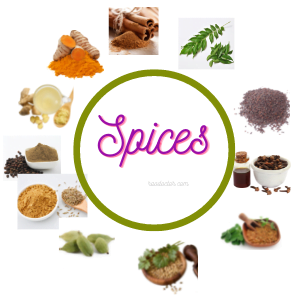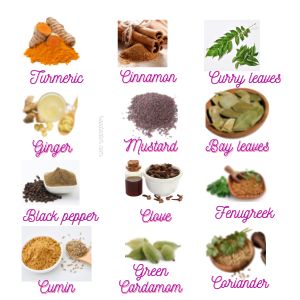What are spices?
Spices, also known as condiments, are dried flowers, fruits, seeds, bark, or roots used to add flavoring, color, and/or aroma to food. They are often used in cooking or baking, and they can be used to enhance the flavor of a dish.
Hi, I am Dr. K. P. V. Rao. I am here to take you through the descriptions of different spices we use in our kitchen to make either a curry or some sweet dish.
Listen to this article
Spices can be used in a variety of forms – whole, ground, dried, or fresh. Some common spices include cinnamon, nutmeg, cumin, coriander, ginger, turmeric, cardamom, clove, paprika, pepper, and saffron.
Spices are thought to have originated in India and are a major part of Indian cuisine. Throughout history, traders have transported many condiments from India to other countries, making them a popular ingredient in many different types of cuisine.
Spices have been used for centuries for their medicinal properties as well as for their flavor. They are believed to have anti-inflammatory, antioxidant, anti-bacterial, and anti-viral properties.
Spices are also believed to aid in digestion and help to boost the immune system. This article will showcase 12 such condiments that will benefit your gut health.
What are the other uses of Spices?
In addition to their culinary uses, spices are also used in perfumery, cosmetics, and even Ayurvedic medicine. They are used to enhance flavor, color, and aroma in many dishes and products, and they often add a unique cultural flavor to a dish.
But did you know that there are many health benefits associated with some of the most commonly used condiments?
In my last article I discussed in detail 11 Gastro-intestinal diseases. In this article, we’ll explore the power of 12 common spices and the potential health benefits of each one, especially in preventing some gastro-intestinal diseases.
Where and how do we use these spices?
As mentioned earlier, in addition to their culinary uses, spices are also used in perfumery, cosmetics, and even Ayurvedic medicine.
They are used to enhance flavor, color, and aroma in many dishes and products, and they often add a unique cultural flavor to a dish.
In India we have 23 states [or provinces] and each state has a culture and culinary methods of its own. People from these states use a variety of condiments to make their dishes/curries taste better.
Whereas all communities may not use all of these spices in their foods, most of them use them in combinations that have more than two of these condiments.
For example, the fish curry you get in Goa will have a different flavor as compared to what you get in Mangalore.
The majority use them in a mixture of powders called masala. Very spicy amongst these is called Garam Masala. And there are many varieties of Garam Masala. Here is one recipe for garam masala that you can try at home- Homemade Garam Masala.
From turmeric and cinnamon to ginger and black pepper, we’ll uncover the science-backed benefits of each spice and how to incorporate them into your daily diet.
Keep reading to unlock the power of 12 spices that will help you stay healthy and enjoy delicious meals at the same time.
In this article, I am just introducing these spices to you. My next article will discuss the nutritional benefits and uses of these tasty condiments.
What are the Health Benefits of Spices?
There are many varieties of spices all over the world. Here we will talk about the most used amongst them in India.
These are the 12 spices I am going to talk about-
- Turmeric
- Cinnamon
- Black pepper
- Ginger or Sunth [dried ginger powder]
- Cloves
- Cumin and
- Coriander
- Mustard
- Fenugreek
- Bay leaves
- Curry leaves
- Green Cardamom
When you add spices to your regular diet, you can reap a variety of health benefits. These are some of the benefits of adding spices to our daily diet-
Better Disease Prevention:
One of the most exciting reasons to incorporate these condiments into your diet is their ability to prevent and lower your risk of certain diseases and conditions.
For example, black pepper has been shown to prevent heart disease and diabetes.
Cinnamon has been shown to prevent hypertension, metabolic syndrome, and diabetes.
Turmeric has been linked with decreased risk of certain cancers including colon cancer. Here I am reminded of a small story related to turmeric-
During my medical college days, we had a very noted surgery professor, the head of Surgery Department, Prof. Deshmane. Once while taking our class on digestive system, he asked us one question- ” Do you know what helps us Indians to have a healthy gut? Well, it is Turmeric in our diet. Turmeric is the best natural antiseptic we can get. You should add it to your diet if you are not already doing it.”
Better Digestion:
In addition to preventing certain diseases, these condiments can also improve digestion. Turmeric has been shown to decrease pain and inflammation, while encouraging healthy liver function.
Cinnamon has been shown to improve digestion and metabolism, while lowering blood sugar and improving insulin sensitivity. Cinnamon has also been known to improve brain health.
Ginger has been shown to increase satiety and aid in digestion while black pepper has been shown to decrease feelings of nausea.
Reduced Cravings:
Including condiments in your diet can help combat cravings for sugary and fatty foods. Black pepper has been shown to increase brain-derived satiety hormones, decreasing the desire for unhealthy foods and helping you maintain a healthy diet.
Cinnamon has been shown to decrease blood sugar levels, helping to prevent cravings for sugary foods and reduce belly fat.
Stronger Immunity:
Spices can boost your immune system, helping you stay healthier and fight off illness. Turmeric has been shown to be anti-inflammatory and encourages the growth of healthy cells, lowering your risk of chronic inflammation.
Cinnamon has been shown to help prevent harmful bacteria from sticking to your cells, lowering your risk of allergies and infections and strengthening your immune system.
Improved Heart Health:
Spices can improve heart health by lowering blood pressure and cholesterol levels. Cinnamon has been shown to lower blood pressure while black pepper has been shown to have heart-protective properties.
Useful Resource- Essential spices for Indian Cooking
Conclusion
In my next article, I will discuss in detail all these condiments and how to put them to use or incorporate them in your diet.
If you have found this article useful, do share it with your friends and relatives by clicking the social share icons at the bottom of this article or just Click to Tweet-
12 spices to help you have healthy digestive system Share on X


